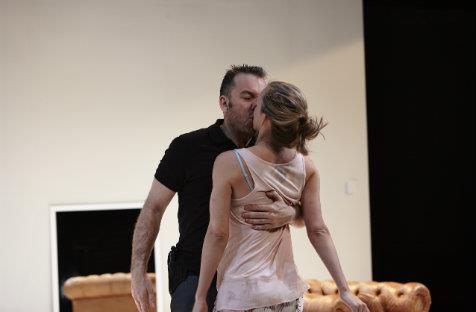Belvoir/Stone have managed to make this notorious classic of the misogynistic canon mildly palatable to a contemporary audience but unfortunate directorial and adaptation decisions mean it ultimately falls flat.
Director Leticia Caceres rightly expressed her reservations about taking on the play written by August Strindberg in 1888: ‘as a director I was thrilled, as a feminist I was not so sure. Strindberg is famous for his deeply anti-feminist plays’. Certainly the gender politics of the original play would be completely abhorrent to progressive audiences if left unaltered.
Simon Stone’s adaptation takes some of the edge off that revulsion by ascribing a multifaceted power (sexual, class-based and ageist) to the 16-year-old Miss Julie, played by Taylor Ferguson, and by inserting an element of self-determination for her in his alteration of the ending. Ferguson was average as Julie, doing better at the flirtatious, transgressive banter than she did at the whiney teenager tantrums, which were nauseating. The intensity of the sex scenes was unnerving given the character’s age.
Christine’s (Blazey Best) weak moral capitulation at the end of the play would make feminists cringe. This came on top of the insults the character weathers from Jean about her lack of sophistication (ultimately a projection of his own insecurities) and the whole premise of the love triangle. In this case Strindberg is more socially progressive than Stone, where he has Christine turn against both of them and command the stable hands to bar them from eloping.
Fresh from his outing in the Save Your Legs cricketing rom-com, Brendan Cowell continued down the macho, ocker groove without hesitation, playing the security attaché for Julie’s father, responsible for her protection. With this character came an undercurrent of bogan lechery and class mobility aspiration, which Cowell handled well. Some lines even seemed written specifically for him – the repugnant story he tells about ‘the dog who fucked the princess’ is an example. He was convincing in portraying the complex web of motivations driving Jean – sexual desire, class mobility, autonomy in terms of work and simply escaping boredom.
Unfortunately, the musical choices were dismal, with the intended juxtaposition between the action and the grandiloquent music being transparent to all, and thus rendered ineffectual. For the opening of the first act we are treated to an image of banal domesticity – an Ikea furnished kitchen setting with white walls, a woman stirring pots. Jolting jabs from the grandiose brass section penetrate the silence, but rather than creating the powerful contrast intended (as in the opening sequence of Michael Haneke’s Funny Games), we are mostly struck by the intrusiveness of the directorial hand. In the second act, cliché horror film stabs accompany the murders and again it feels like a cheap Hitchcock knock-off with little or no punch.
A valiant effort at bringing relevance to a relic of the misogynistic past, but ultimately one thinks: why not pick something else to adapt?
Rating: 3 stars out of 5
Miss Julie
Belvoir Theatre Company
Written by Simon Stone, after August Strindberg
Director: Leticia Caceres
Set Designer: Robert Cousins
Costume Design: Tess Schofield
Lighting: Damien Cooper
Composer & Sound: The Sweats
Performers: Taylor Fergus, Brendan Cowell and Blazey Best
Upstairs Theatre, Belvoir St Theatre, Surry Hills
24 August – 6 October
(Pictured: Brendan Cowell and Taylor Ferguson in Belvoir’s Miss Julie. Photo: Ellis Parrinder)





